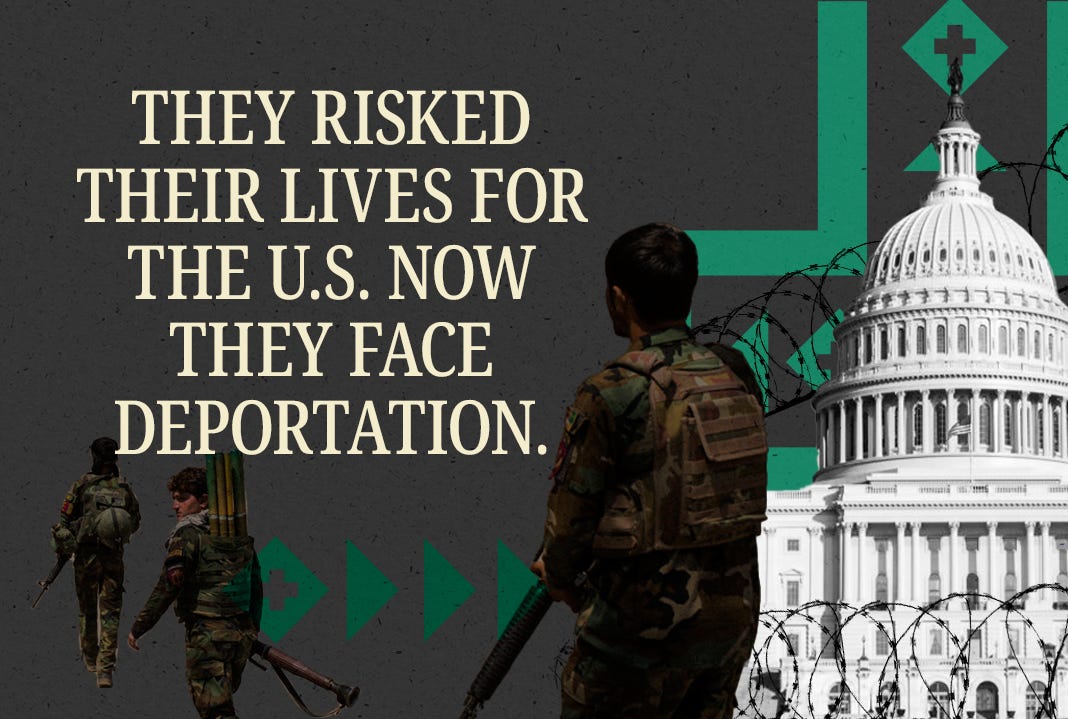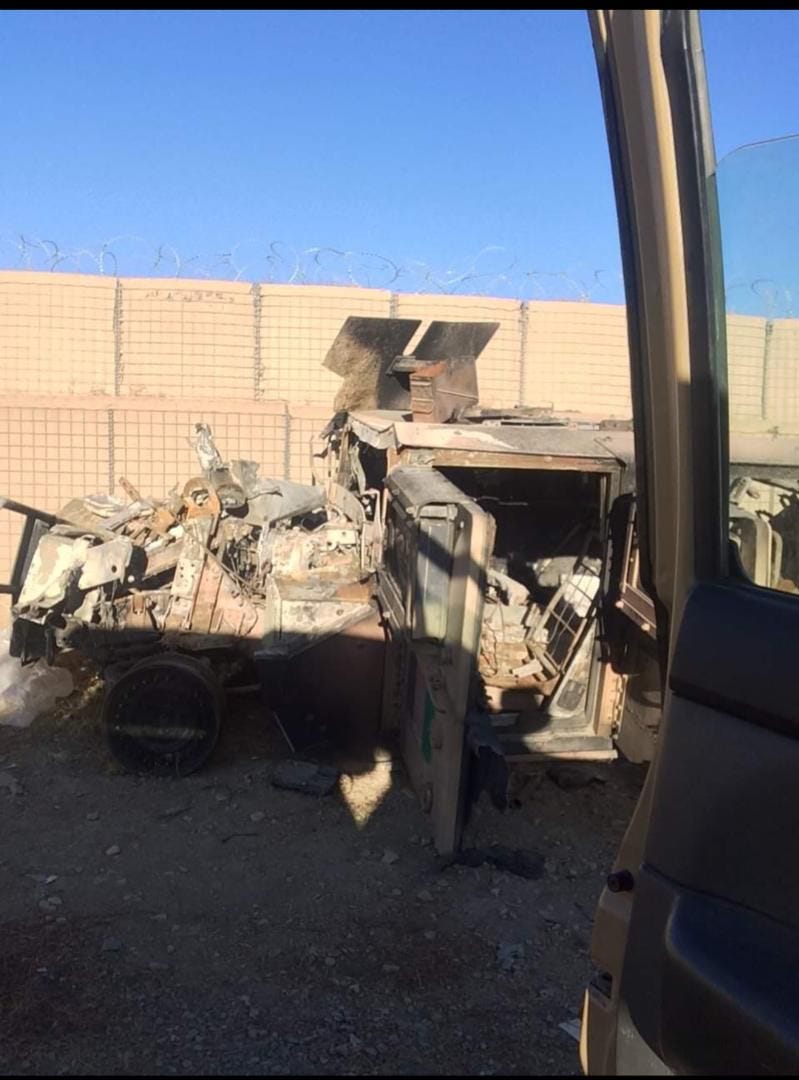They Risked Their Lives for the U.S. Now They Face Deportation.
The U.S. government is ending protections for thousands of Afghan allies, many of whom once fought alongside American troops
KABUL, Afghanistan — Few groups, aside from Afghan women, saw their hopes and trust shattered as completely as the men who served in the Afghan National Security Forces (ANSF). These soldiers were the frontline defenders during two decades of brutal conflict with the Taliban. More than 66,000 members of the ANSF were killed in that time, along with 3,846 U.S. and coalition troops. And then, on August 15, 2021, they were abruptly abandoned. As the republic collapsed, corrupt politicians scrambled for the exits, leaving their soldiers to the mercy of the insurgents they had fought for years. Thousands of them remain in Afghanistan today. What followed was not peace, but a life defined by fear, hardship, and betrayal.
Last week, the Department of Homeland Security, under Secretary Kristi Noem, announced the termination of Temporary Protected Status (TPS) for Afghanistan. The move could impact more than 9,000 Afghans currently living in the United States under this humanitarian designation. First granted during the Biden administration in the wake of the U.S. withdrawal, TPS was meant to shield vulnerable Afghans while evacuation efforts continued. Now, with the designation set to end on July 14, 2025, those who once fought alongside U.S. forces may face deportation.
"This administration is returning TPS to its original temporary intent," said Secretary Noem. "Afghanistan has had an improved security situation, and its stabilizing economy no longer prevents them from returning to their home country."
But what awaits those who return is neither security nor stability. Since the Taliban seized control in 2021, they have carried out more than 200 extrajudicial killings of former Afghan officials and military personnel. Human rights monitors believe the real number is significantly higher.
General Sami Sadat, once a senior Afghan army officer and now chairman of the opposition group Afghanistan United Front, calls the Taliban's so-called "general amnesty" a sham.
"They [The Taliban] have neglected what they promised to the Qataris and the Americans. During these last three and a half years, more than 11,000 personnel from the armed forces have been killed. Sixty thousand people have been imprisoned and tortured. Thirty-eight thousand members of the army, police, and intelligence, or their families, are in Taliban prisons for different reasons. Most of the 11,000 military personnel killed by the Taliban were killed inhumanely and were tortured severely."
Sadat does not equivocate when it comes to Islamist extremism. "Radical extremist ideologies have no place in America or elsewhere," he told me. "Those Afghans who support terrorism and the Taliban in the US and have taken a stance against the republic must be deported. If they are praising the Taliban, maybe they should join them in Afghanistan, and this should not exempt ex-military personnel." He claims U.S. intelligence agencies have been monitoring Afghan arrivals and supports taking action against any found to harbor extremist views.
Sadat is not alone in sounding the alarm. Jawid*, a former officer who was injured in the line of duty, was responsible for protecting high-ranking officials in Kabul when the Taliban entered the capital. He remembers August 15 as a day of shame and betrayal. "The previous government told us the Taliban was the enemy, they mobilized us against them, made us fight them, and eventually they fled the country and left us behind under the Taliban rule," he told me.
Now 34, Jawid works in a clerical job at a government ministry. His English skills earned him the position, but most of his fellow soldiers were not so lucky. Many are unemployed or trapped in low-wage labor. The collapse of the republic was followed by the near-total implosion of the Afghan economy. General Sadat puts it bluntly: "When twenty million Afghans don't have the capacity for three meals a day, sixteen million Afghans do not have access to basic hygiene, and there is no way for most Afghans to sustain life—how can we say an economy exists?"
Sadat believes that foreign aid, one of the country's last remaining lifelines, is being funneled to Taliban loyalists. This, he argues, is not sustainable. He predicts that war will return to Afghanistan, and says the Taliban lacks the capacity to hold its ground if conflict erupts on multiple fronts.
In the meantime, soldiers inside Afghanistan like Jawid watch their comrades endure daily indignities. The Taliban’s animus toward former military personnel is no secret. Jawid described how one former commando, falsely accused of hiding an American-made M4 rifle, was tortured in his own home. "They alleged that he had hidden an American-made M4 rifle in his house. The Taliban raided and searched his house while his family, including his elderly mother, was present. He was taken to the basement of their house, where seven Taliban soldiers tortured him in front of everyone. He kept telling them they were wrong and that he had no rifles. He admitted he only had a Glock, which he turned over to them. He was eventually spared his life, but at the cost of humiliation and torture in his own house. He works at a factory where he unloads cargo, working 12-hour night shifts for only 280 Afghanis ($4 US) per shift."
The TPS announcement was met with fierce criticism across social media. But the backlash intensified when Cheryl Benard, a political writer and the wife of former U.S. envoy Zalmay Khalilzad, argued that Afghan refugees "should not fear repatriation."
It was Khalilzad who brokered the 2020 Doha Agreement between the U.S. and the Taliban—a deal widely viewed in Afghanistan as a diplomatic surrender. Skepticism toward his intentions and legacy remains high. Benard's comments, meanwhile, were met with widespread condemnation. According to Khaama Press, more than 60 women's rights organizations have called for her to be disqualified from working with international institutions.
Her assertion that women are thriving under Taliban rule—"saleswomen in the malls... female wait staff in restaurants... women operating their own push carts on the streets"—was taken as a direct affront to Afghan activists who risk their lives to fight for basic rights.
As global advocates continue to call attention to Afghanistan's grim reality, General Sadat is urging Western leaders and the United States in particular to support the anti-Taliban opposition. "We do not require a lot of resources, only political support," he said. But while Sadat campaigns in Washington, Jawid and his comrades live with the consequences of America’s withdrawal inside the country. "The pain and stories are too much. We performed our duties sacredly, but here we are," referring to the deteriorating situation of his fellow colleagues. “One of my close friends who was stationed with the border patrol was imprisoned for 70 days in a dark cell. He did not see the sun for 70 days.”
Despite the grim consequences, the Department of Homeland Security has shown no signs of reversing its decision. In a written statement, Assistant Secretary Tricia McLaughlin defended the policy. "Although TPS was terminated as required by law, any Afghan who fears persecution can request asylum. All aliens who have had their TPS or parole terminated or are otherwise in the country unlawfully should take advantage of the CBP Home self-deportation process to receive a free one-way plane ticket and $1,000 financial assistance to help them resettle elsewhere."
It is a bitter irony. Those who risked their lives for the republic are now offered a modest stipend and a plane ticket, not to safety, but to the very regime they once fought against. The decision strips away not only protection, but dignity, severing the final tie between these soldiers and the country that promised to protect them. For many, deportation is not a bureaucratic formality—it is a possible death sentence. And for America, it is a moral abdication.
Middle East Uncovered uses pseudonyms to protect our sources in Afghanistan.
Middle East Uncovered is powered by Ideas Beyond Borders.




